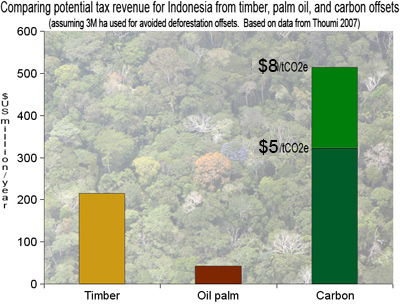Avoided deforestation beats timber, palm oil, in tax revenue for Indonesia
Avoided deforestation beats timber, palm oil, in tax revenue for Indonesia
mongabay.com
October 29, 2007
Indonesia could more than double its tax revenue by protecting forests and selling the resulting carbon emission credits instead of timber and palm oil, a University of Michigan researcher told Bloomberg.
Gabriel Thoumi, a consultant and fellow at the Erb Institute for Global Sustainable Enterprise at the University of Michigan in Ann Arbor, estimates that carbon credits would generate $515 million a year in tax revenue starting in 2013 for the Indonesian government. By comparison, tax revenue from logging and palm oil is presently around $258 million a year.
Thoumi’s calculations are based on the assumption that Indonesia could sell 750 million metric tons of credits annually at a price of $8 per ton. United Nations-certified emission reduction credits for delivery in 2008 currently trade at nearly $21 per ton.

|
The $8.6 billion in annual revenue from carbon offsets would come in addition to the $5.4 billion in timber exports and the $4.4 billion in palm oil exports Indonesia presently earns.
Carbon offsets through avoided deforestation are seen as an promising mechanism to offset greenhouse gas emissions. In 2006 deforestation and other land-use change accounted for 1.5 billion tons of carbon emissions, or around 15 percent of total anthropogenic emissions, according to a study published last week in the journal Proceedings of the National Academy of Sciences. Scientists and environmentalists say that avoided deforestation will delivery ancillary benefits beyond carbon sequestration, including watershed conservation and biodiversity preservation. Some argue that avoided deforestation could be a sustainable way to improve the lives of rural poor.
To date more than a dozen tropical countries have expressed interest in a $200 million forestry fund launched by the World Bank earlier this month. The fund will launch in December at the UN climate conference in Bali, Indonesia.
Related
Does palm oil alleviate rural poverty in Malaysia?
(10/23/2007) While it is often argued that the economic benefits of oil palm plantations outweigh the environmental costs of converting biodiverse ecosystems to monocultures, new analysis suggests that the role of plantations in reducing rural poverty may be overstated.
Could peatlands conservation be more profitable than palm oil?
(8/22/2007) This past June, World Bank published a report warning that climate change presents serious risks to Indonesia, including the possibility of losing 2,000 islands as sea levels rise. While this scenario is dire, proposed mechanisms for addressing climate change, notably carbon credits through avoided deforestation, offer a unique opportunity for Indonesia to strengthen its economy while demonstrating worldwide innovative political and environmental leadership. In a July 29th editorial we argued that in some cases, preserving ecosystems for carbon credits could be more valuable than conversion for oil palm plantations, providing higher tax revenue for the Indonesian treasury while at the same time offering attractive economic returns for investors.